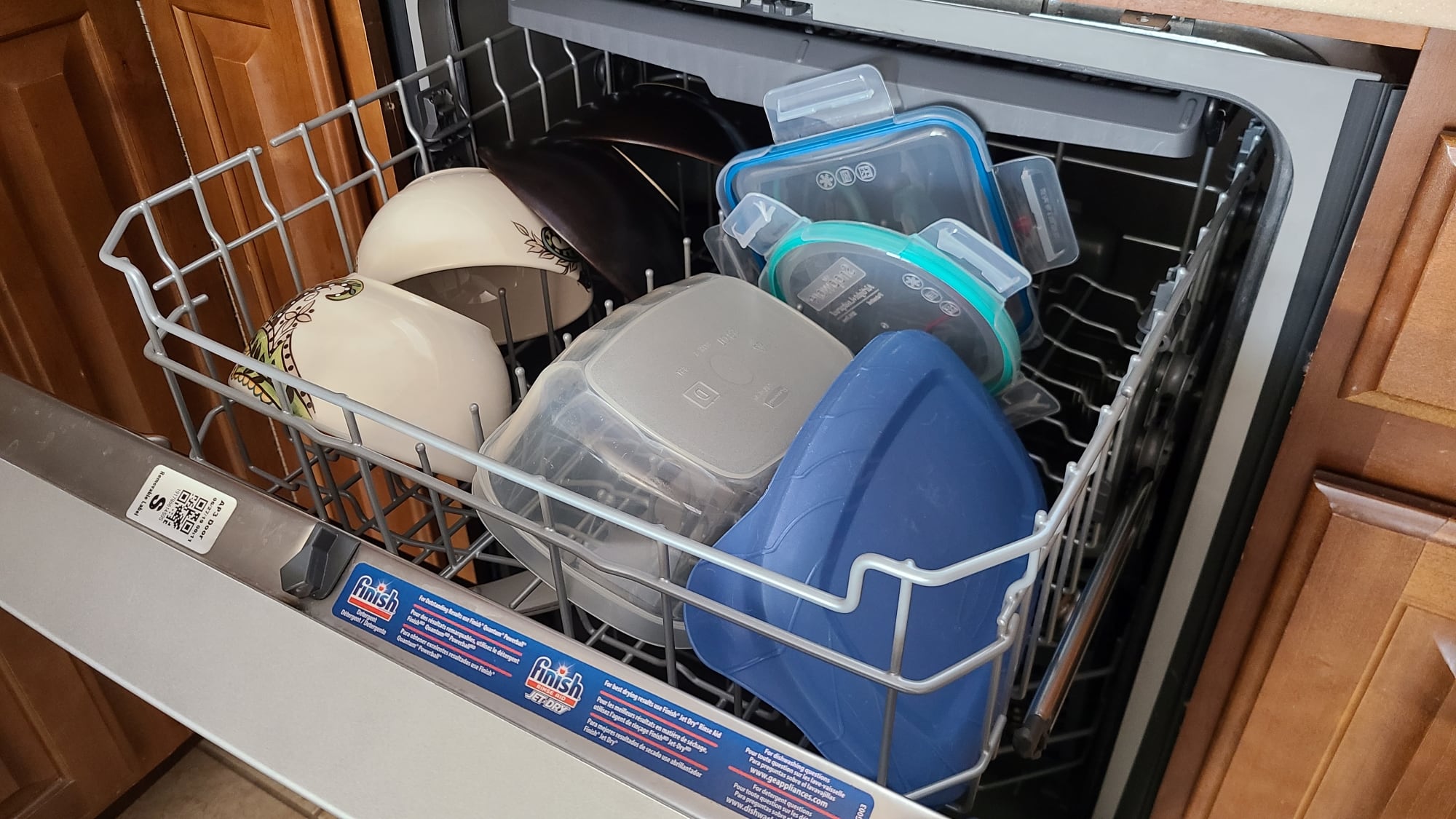Dishwashers are a great convenience, and so are reusable plastic containers and bottles.
You may be wondering if you can take advantage of both of these simultaneously and clean your plastic containers in the dishwasher. The answer to this is yes, most of the time, and with a few common-sense safety measures.
Read on to learn more about what kinds of plastic can go in the dishwasher and how you can reduce the risk of damage to your plastic kitchenware or your health.
Different Types of Plastic
Most plastics made these days are labeled, which means that you can easily see whether you can put them in the dishwasher safely.
The designations are:
- PETE/PET (1): Polyethylene terephthalate. PETE, or PET, plastic appears clear. Disposable beverage bottles are usually PET plastic.
- HDPE (2): High-density polyethylene. HDPE plastic is usually white/opaque. It is frequently used for milk and juice bottles, detergent tubs, and more.
- PVC (3): Polyvinyl chloride. PVC is used for cling wrap and some bottles. It is not heat-resistant and it should not go in the microwave or dishwasher.
- LDPE (4): Low-density polyethylene. LDPE is widely used in grocery bags, plastic wrap, and other packaging. It is unlikely that you will want to wash LDPE plastic.
- PP (5): Polypropylene. This tough plastic is typically used in pre-packaged food dishes, condiment bottles, and medicine containers. It is heat-resistant and usually labeled as microwave-safe.
- PS (6): Polystyrene. This is commonly known as Styrofoam. It should not go in the dishwasher, and there is no reason you would need to wash it.
- PC/OTHER (7): This category includes polycarbonate (PC) and “other” plastics. Some polycarbonate plastic food containers contain BPA.
Many food storage containers and lids are made from polypropylene, which is generally considered dishwasher-safe – more on that below.
When a plastic item is designated dishwasher-safe, this means that it has been treated to withstand the sustained high heat in a dishwasher.
It will not melt, warp, or dissolve in a standard home-use dishwasher.
Types of plastic that should never be used in a dishwasher include PVC, polystyrene, and polycarbonate.
These contain chemicals (PVC contains phthalates, polystyrene contains styrene, and polycarbonate contains BPA) that will break down and leak out in the dishwasher.
These chemicals are dangerous to human health and should be avoided.
Luckily, most people do not ever put plastic wrap or Styrofoam in the dishwasher, so there is not much cause for concern here.
You Can Put Plastics in a Dishwasher, But Should You?
We have established that most plastic containers made to be used with food are indeed safe to be used in the dishwasher.
However, that means that they will not leach dangerous chemicals, and they will not warp or melt immediately.
Here, “safe” means no immediate damage. It doesn’t mean that it’s a great idea.
Dishwashers have to be very harsh to be so efficient.
They use boiling water, strong detergents, and a heated drying cycle so that your dishes are ready to go as soon as you open the door.
This is convenient, but it is also destructive.
Even plastic kitchenware that is designated dishwasher-safe will break down under these conditions.
The plastic will get thinner and wear out more quickly than expected.
It may also develop what looks like a hazy white film. This film comes from minerals in hard tap water.
Not only is it unattractive, but it can etch tiny scratches into your plastic dishes.
These scratches will harbor food and germs, which means that your plastic kitchenware is never really clean.
That is disappointing and kind of disgusting!
What To Do With Plastic Kitchenware
If you still want to wash your plastic dishes in the dishwasher, they should only go on the top rack.
Never use the “sanitize” cycle since that is even hotter than the default cycle.
If you have the option to turn off the heated drying cycle, you should consider doing that as well to preserve the life of your plastic ware.
However, it’s better all-around to simply wash your plastic dishes by hand.
You can use water that feels hot to you if you think that it cleans better.
Water that comes from the tap and that you can touch with your hands is less hot than the temperatures that a dishwasher produces.
Liquid dish soap is also much gentler than detergent designed for the dishwasher.
You could also start replacing your plastic storage containers with glass ones.
Glass storage is more environmentally friendly than plastic.
There is absolutely no concern about using it in the dishwasher – many glass storage sets do have plastic lids, though, and you can still hand wash these.
You can also use all your glass storage containers in the microwave, which is a bonus and one less thing to worry about.

